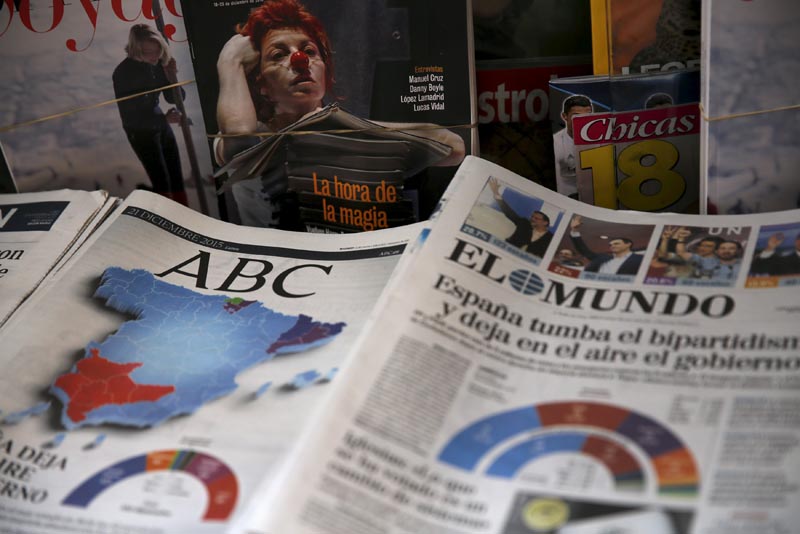Spain enters political unknown as tough coalition talks beckon
- Upstart parties transform Spain's political landscape
- Spain faces complex negotiations on new government
- Left-wing parties gain most clout
- New election may be needed if talks fail
- Uncertainty unnerves financial markets
MADRID: Spain entered the political unknown on Monday after the most fragmented national election in its history, as old and new parties fired the first salvos in coalition talks that are likely to be long and complex.
With neither outgoing Prime Minister Mariano Rajoy's PP conservatives nor left-wing parties winning a clear mandate to govern, the country faces weeks of uncertainty that cast doubt on the durability of its flagship economic reforms and unnerved financial markets.
Two newcomers - leftist anti-austerity Podemos ("We can") and liberal Ciudadanos ("Citizens") - entered the mainstream for the first time in Sunday's parliamentary vote, ending decades of two-party domination and raising the possibility of new elections.
"A new chapter of historic compromises is being opened in our country," Podemos leader Pablo Iglesias said on Monday. "All of us will have to reflect in the next weeks on how these elections are driving a transition towards a new political system."
The PP - which gets the first chance to form a government - won most votes but fell way short of a majority as millions deserted the centre-right right party and the main opposition Socialists, which finished second.
The two have alternated in power since the death of dictator Francisco Franco in 1975, but this time Podemos and Ciudadanos tapped widespread anger over a recently-ended economic slump and high-profile corruption to storm into parliament as significant forces in third and fourth.
The surprise surge by Podemos - the latest of several strong showings by populist parties in European elections - gives it an influential role in coalition talks.
The inconclusive vote heralded a new era of pact-making that kicked off on Monday as party executives met to assess the implications, while nervous investors moved out of Spanish assets, sending the country's shares lower and benchmark bond yields higher.
Albert Rivera, leader of business-friendly Ciudadanos, which won 40 seats in parliament, came out in support of a PP minority government, which would negotiate with Ciudadanos, the Socialists and Podemos to support it in votes on different laws.
But Senior Socialist official Cesar Luena repeated the party's position on Monday that it would reject a new government led by Rajoy, as did Iglesias.
Rivera also said a left-wing coalition that could consist of up to 11 parties would not be viable. "Spain cannot allow itself to be Greece, Spain cannot allow itself to be a chaotic country," he told Telecinco TV.
THE NUMBERS DON'T ADD UP
The electoral mathematics make it a tough ask for any party to put together the 176 seats needed for a majority in the 350-seat parliament, setting the stage for potentially fraught negotiations.
"I am asking everyone to show responsibility, because the stability of Spain is at stake, progress in the economic recovery is at stake," Fernando Martinez-Maillo, a top PP official, told Cadena Ser radio.
If Rajoy's PP is unable to form a government, the Socialists may attempt to build a left-wing coalition.
That raises the prospect of a replay of events in neighbouring Portugal, where the incumbent conservatives won an October election but a socialist government backed by far left parties was sworn in.
The close result in Spain also magnifies the importance of small separatist parties from Catalonia, which could try to extract concessions such as the promise of an independence referendum as the price for their support.
Also at stake is whether Spain continues to follow the belt-tightening measures to cut its budget deficit that the PP credits for helping end a recession and generate economic growth above the euro zone average.
Both Podemos and the Socialists have pledged to slow the pace of deficit-cutting if they gain power.
But the only simple combination of parties that would add up to a clear majority would be an alliance of the PP and Socialists in a "grand coalition".
In practise, unless the Socialists can be talked into supporting that option, Spain could be contemplating a period of weak minority government or new elections in the new year.
Meantime, once the new parliament and senate begin sitting from Jan. 13 onwards, it will be up to King Felipe VI to put forward a candidate for prime minister - giving a potentially important role to a man who was crowned only last year.






